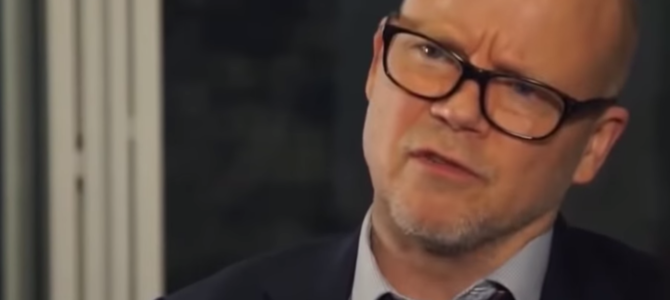
Toby Young is busy again, as the international man of no mystery — he is everywhere if you check the British news. When he is not editing for Quillette and The Spectator, running free schools for gifted underprivileged kids, or doing stand-up routines or podcasts, he is busy setting up a Free Speech Union against humorless Soviet scolds, his latest project to take the fight back to leftist mobs and cancel cultures.
“I was canceled by a digital outrage mob two years ago. Theresa May, then the British prime minister, appointed me to the board of a new higher education regulator, and within minutes of it being announced, the offense archaeologists got to work,” he says.
They dug up Young’s old tweets about women’s bodies and pornography, naturally calling him a racist and homophobic bigot, and an online petition circulated with more than 220,000 signatures.
“It was brutal … and one of the worst things about it was feeling isolated and alone, not knowing who to turn to for advice and support,” he said in an interview. “I remember thinking at the time, ‘Wouldn’t it be great if there was an organization that protected people who find themselves being targeted in this way?’”
The idea for his new Free Speech Union was a result of that experience. The organization, arguably the first of its kind in modern British history, will include professionals and actively organize in support of free speech, even providing legal aid to people facing the mob. Think of it as a British version of American Civil Liberties Union, but one that actually works to defend free speech without nonsensical transgender activism or stupid intersectional tweets.
I asked him a few questions about his plans to support conservative students on campuses and to tackle social media censorship. The interview, edited for length and clarity, is below.
SM: To play devil’s advocate for a moment, where’s the inevitable line on free speech? Who draws it, on what basis, and how does FSU plan to gate-keep that?
TY: As a general principle, we draw the line in the same place as the First Amendment. Everything should be permitted, save for incitements to immediate violence against specific groups. The line drawn by the British courts and the European Court of Human Rights, which is the highest court of appeal when it comes to free speech in the United Kingdom, is significantly less permissive than that. So while we will campaign for the law to be changed, we won’t go to bat for people who break the law as it stands, only those who stay within the law.
That means we’ll defend one of our members if they’re punished by a public authority for exercising their lawful right to free speech, but not if they break the law. If they’re penalized by a private social media company, like Twitter, for exercising their lawful right to free speech, it’s less clear-cut because we don’t want to infringe the company’s freedom of association. I think Twitter is over-censorious at present, but I trust the market to correct that.
The problem with passing legislation to compel social media companies to protect free speech is that it opens the door to state regulation of social media content — which already happens in Germany and is being proposed by the current British government. That will mean more censorship, not less, and the regulators are bound to be members of the liberal metropolitan elite.
SM: In the U.S., there has been a late realization that conservatives have lost academia, unless there’s a “reaction,” so to speak. There are associations and think tanks trying to reverse the rot. British academia is arguably a far worse echo chamber. What are the future plans of FSU to tackle this?
TY: The FSU will have an educational arm, and one of the things we’ll be doing is encouraging students to set up free speech societies and offering them legal and political advice on how to stop their guest speakers from being no-platformed, as well as how to deal with efforts by student unions and university authorities to shut them down.
In addition, we want to address the problem posed by the Equality Act 2010, which imposes a public duty on universities to prevent the “harassment” of minorities, not to create a “hostile environment” for minorities, to ensure minorities aren’t “discriminated” against by their peers, and so on. That’s often invoked by diversity-crats to justify no-platforming some conservative speakers — allowing a politician who’s opposed to open borders to speak on campus is a form of harassment against the descendants of immigrants, or creates a hostile environment for them, or will prompt white heterosexual men to discriminate against them.
Sometimes, the obstruction is more subtle: The speaker in question isn’t no-platformed, but the society that’s invited him is obliged to hack their way through a forest of red tape that the diversity-crats claim they’re obliged to put in place because of the Equality Act, such as carrying out a “risk assessment.” The result is that people like Jacob Rees-Mogg aren’t invited to speak on campuses because the conservative students thinking about inviting him know they’ll have to jump through an endless series of hoops if they do.
SM: Will there be any government lobbying about legalizing and codifying “free speech,” like the United States?
TY: The Human Rights Act 1998 incorporates into British law the European Convention on Human Right, and Article 10 of the convention is the right to freedom of expression and information. That law makes the European Court of Human Rights the highest court of appeal in the U.K. when it comes to free speech issues. Unfortunately, Article 10 also says the right to free expression can be subject to restrictions that are “necessary in a democratic society,” which means it doesn’t have the same force as the First Amendment.
The current government could bring forward a Bill of Rights, removing the European Convention of Human Rights and taking the U.K. outside the jurisdiction of the European Court of Human Rights. If the government does go down that road, the FSU will lobby for something like the First Amendment to be incorporated into the Bill of Rights.
But we would then be entrusting the protection of free speech to the Supreme Court of the United Kingdom rather than the European Court of Human Rights, and as we saw during the recent Brexit crisis, the Supreme Court is dominated by liberals, not least because the process by which Supreme Court justices are selected is designed to screen out conservatives. The European Court of Human Rights is dominated by liberals too, but less so than the Supreme Court because the justices are appointed from a pool put forward by the EU’s member states, and some of them are conservative — Hungary and Poland, for instance. I’m in favor of replacing the Human Rights Act with a Bill of Rights, provided Supreme Court justices are appointed by the prime minster and ratified by Parliament, like the process in the United States.
SM: How has the reaction been when you launched the FSU? What type of opposition have you faced, and from whom?
TY: The reaction from conservatives and some members of the progressive left — the non-woke left — has been overwhelmingly positive. The coalition of journalists, politicians, and intellectuals from all parts of the political spectrum that supported Brexit, of which I was one, are also very supportive of free speech. It feels to me as if this could be the next big issue for this coalition to get behind, now that Brexit’s happened. There’s been some criticism, of course, but it’s been of an intellectually threadbare kind — such as the claim that when male, pale, and stale conservatives like me talk about free speech, what they really mean is that they want to be able to say offensive things about minorities without suffering any negative repercussions. I think that one’s fairly easy to rebut.
The most encouraging thing has been the reaction from ordinary people. So far, 2,000 members have signed up and paid their dues. At one point, they were joining at the rate of one every two minutes. If we can get 10,000 members by the end of the year, we’ll be in business.









